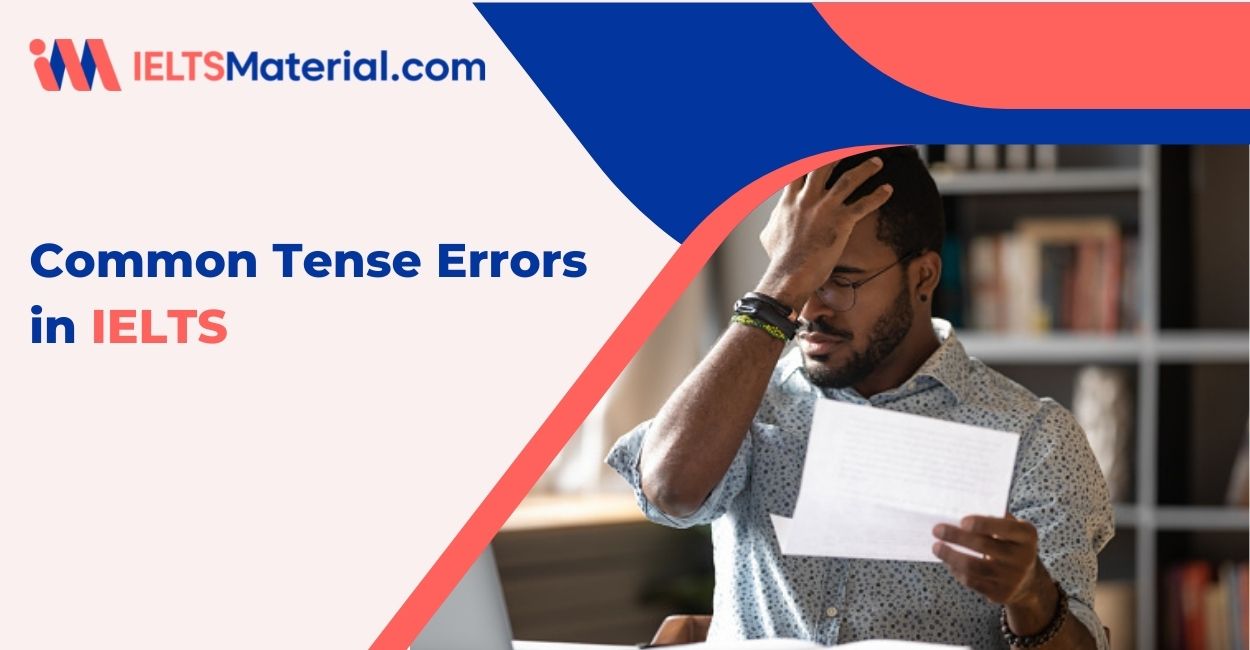Common Tense Errors in IELTS
Table of Contents

Limited-Time Offer : Access a FREE 10-Day IELTS Study Plan!
Students make several tense errors when constructing sentences. Students who receive a band 5 make errors in simple sentences while writing and speaking, while students who receive a 7 or higher Band make mistakes when writing complex sentences.
Let’s start by looking at the various types of tenses, as well as some examples and typical mistakes.
Past, present, and future tenses are the three types of tenses used to convey feelings and thoughts in sentences.
Start by going through the examples to see which common tense errors you make while speaking or writing.
| Incorrect: He is sleeping for three hours now.
Correct: He has been sleeping for three hours now. |
The error in the sentence is that the present continuous tense was used instead of the present perfect continuous tense. The present perfect continuous tense is typically used to describe acts that began in the past and are still ongoing in the present.
| Incorrect: My friend has seen her yesterday.
Correct: My friend saw her yesterday. |
| Incorrect: I have bought a new pair of shoes last week.
Correct: I bought a new pair of shoes last week. |
The error in the sentence is that the present perfect tense was used instead of the simple past tense. Thus, you cannot use adverbs of the past such as yesterday, last week, last year, and so on in the present perfect tense.
Let’s understand the rules of tenses to avoid these common mistakes.
He goes to school every day.
They go to school every day.
In first sentence,
Subject = He
Verb = goes
Object = school every day
In second sentence,
Subject = They
Verb = go
Object = school every day
Present Tense
Present Simple
Singular = subject + (s/es) + verb (1st) + object
Plural = Subject + verb (1st) + object
| E.g.:
Sam goes to school every day. They go to school every day. |
Present Continuous
Singular = subject + is + verb + ing + object
Plural = Subject + are + verb (1st) + ing + object
| E.g.:
Sam is going to school every day. They are going to school every day. |
Present Perfect
Singular = subject + has + verb (3rd) + object
Plural = Subject + have + verb (3st) + object
| E.g.:
Sam has gone to school. They have gone to school. |
Present Perfect Continuous
Singular = subject + has been + verb (1st) + ing + object + for/since
Plural = subject + have been + verb (1st) + ing + object + for/since
| E.g.:
Sam has been going to school every day since he was 4 years old. They have been going to school every day since they were 4 years old. |
Past Tense
Past Simple
Singular = subject + verb (2nd) + object
Plural = Subject + verb (2nd) + object
| E.g.:
Sam went to school every day. They went to school every day. |
Past Continuous
Singular = subject + was + verb + ing + object
Plural = Subject + were + verb (1st) + ing + object
| E.g.:
Sam was going to school every day. They were going to school every day. |
Past Perfect
Singular = subject + had + verb (3rd) + object
Plural = Subject + had + verb (3rd) + object
| E.g.:
Sam had gone to school. They had gone to school. |
Past Perfect Continuous
Singular = subject + had been + verb (1st) + ing + object + for/since
Plural = subject + had been + verb (1st) + ing + object + for/since
| E.g.:
Sam had been going to school every day since he was 4 years old. They had been going to school every day since they were 4 years old. |
Future Tense
Future Simple
Singular = subject + will/shall + verb (1st) + object
Plural = Subject + will/shall + verb (1st) + object
| E.g.:
Sam will go to school every day. They will go to school every day. |
Future Continuous
Singular = subject + will/shall be + verb (1st) + ing + object
Plural = subject + will/shall be + verb (1st) + ing + object
| E.g.:
Sam will be going to school every day. They will be going to school every day. |
Future Perfect
Singular = subject + will/shall has + verb (3rd) + object
Plural = subject + will/shall has + verb (3rd) + object
| E.g.:
Sam will have gone to school. They will have to go to school |
Future Perfect Continuous
Singular = subject + will/shall has been + verb (1st) + ing + object + for/since
Plural = subject + will/shall have been + verb (1st) + ing + object + for/since
| E.g.:
In October, Sam will have been going to this school for six months In October, They will have been going to this school for six months |
Explore IELTS related articles

Start Preparing for IELTS: Get Your 10-Day Study Plan Today!
Recent Articles

Nehasri Ravishenbagam

Nehasri Ravishenbagam

Haniya Yashfeen





Post your Comments